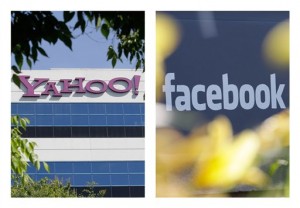Yahoo, Facebook settle patent dispute, ad alliance

This combination of 2012 file photos shows the logos of Yahoo, left, and Facebook, outside their offices in Santa Clara, Calif. and Menlo Park, Calif. The two companies have agreed to settle a patent dispute on Friday, July 6, 2012, averting a potentially bitter battle over the technology running two of the Internet's most popular destinations. (AP Photo/Paul Sakuma)
SAN FRANCISCO — Facebook and Yahoo have agreed to settle a patent dispute, averting a potentially lengthy battle over the technology running two of the Internet’s most popular destinations.
In dropping the lawsuits, the companies agreed to license their patents to each other. They are also agreeing to an advertising alliance that expands their existing partnership.
The advertising alliance could help Yahoo recover some of the revenue that it has been losing as marketers shift more of their spending to a larger and more engaged audience on Facebook’s online social network.
Friday’s settlement involves no exchange of money and comes after a months-long patent squabble between the two Internet icons.
The truce ends a conflict provoked by Yahoo’s short-lived CEO, Scott Thompson, who was dumped from the job two months ago after misinformation on his official biography raised questions about his integrity.
Under Thompson, Yahoo filed the patent lawsuit in March, wielding it as a weapon against a company that Thompson believed had been prospering from the ideas of its older rival. The complaint alleged that Facebook infringed on 10 Yahoo patents covering Internet advertising, privacy controls and social networks. Yahoo Inc. added two more patents to the lawsuit later.
But Thompson’s attack on Facebook Inc. quickly turned into a public-relations disaster. Much of the technology industry railed against Yahoo’s tactics. Critics viewed the lawsuit as a financial shakedown by a desperate company whose well of innovation had run dry.
New York venture capitalist Fred Wilson summed up the enmity toward Yahoo in an acerbic blog post that ended with this denouement: “I am writing this in outrage at Yahoo. I used to care about that company for some reason. No more. They are dead to me. Dead and gone. I hate them now.”
When Yahoo replaced Thompson in May with interim CEO Ross Levinsohn, it opened the door for the company to settle the dispute under a reshuffled board of directors. Six of Yahoo’s 11 directors joined the board after Yahoo sued Facebook on March 12.
Yahoo’s legal assault had exposed Facebook’s vulnerability to patent claims as it prepared to complete the biggest initial public offering of stock by an Internet company.
Facebook insulated itself by buying 750 patents from IBM Corp. for an undisclosed amount and spending $550 million to acquire an additional 650 patents that one of its biggest shareholders, Microsoft Corp., had purchased from AOL Inc. Armed with its own arsenal of intellectual property, Facebook signaled that it wasn’t backing down and filed its own lawsuit against Yahoo in April for patent infringement.
With Thompson out, Levinsohn was free to work out a deal with Facebook’s chief operating officer, Sheryl Sandberg. The two issued statements Friday praising each other for working toward a deal.
With the agreement, Yahoo and Facebook revert to the amicable relationship that they had been fostering before the lawsuit. And it appears the antagonism is dissolving into a partnership that could benefit both companies.
Yahoo already has been tying many of its services and content to Facebook before the lawsuit was filed. Now the two companies plan to display ads on each other’s sites, while Yahoo plans to feed even more of its coverage of major events to the social network.
Although it has been growing at a robust clip, Facebook is still trying to win over skeptical investors. Doubts about the company’s revenue potential have weighed on Facebook’s stock, which has remained well below its IPO price of $38. The stock gained 26 cents, or nearly 1 percent, to close Friday at $31.73.
Yahoo is trying to snap out of a long-running financial funk brought up by Facebook’s success and Google Inc.’s dominance of Internet search and advertising.
As revenue fell, Yahoo has gone through four fulltime CEOs in five years in hopes of engineering a turnaround. The foibles have depressed Yahoo’s stock, frustrating shareholders still angry about a squandered opportunity to sell the entire company to Microsoft in May 2008 for $47.5 billion, or $33 per share.
The stock dipped 7 cents to close at $15.78.
The Facebook pact may have pushed Levinsohn closer to being anointed as Yahoo’s permanent CEO. Jason Kilar, CEO of online TV service Hulu, had been under serious consideration for the top job at Yahoo, but Hulu said Friday that he had decided not to pursue the position. The statement was issued in response to several published reports citing unnamed people who described Kilar as Levinsohn’s primary competition for the Yahoo post.